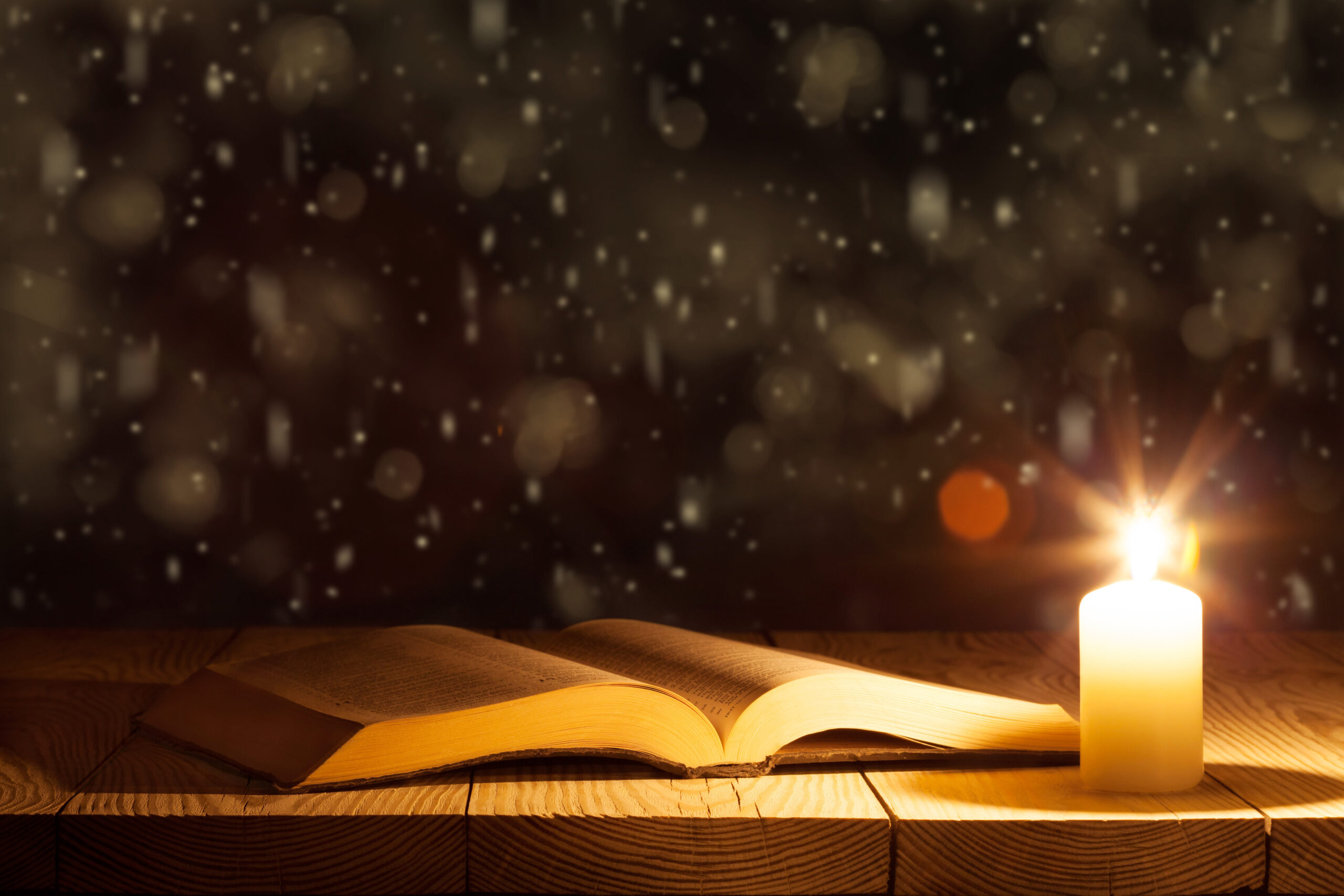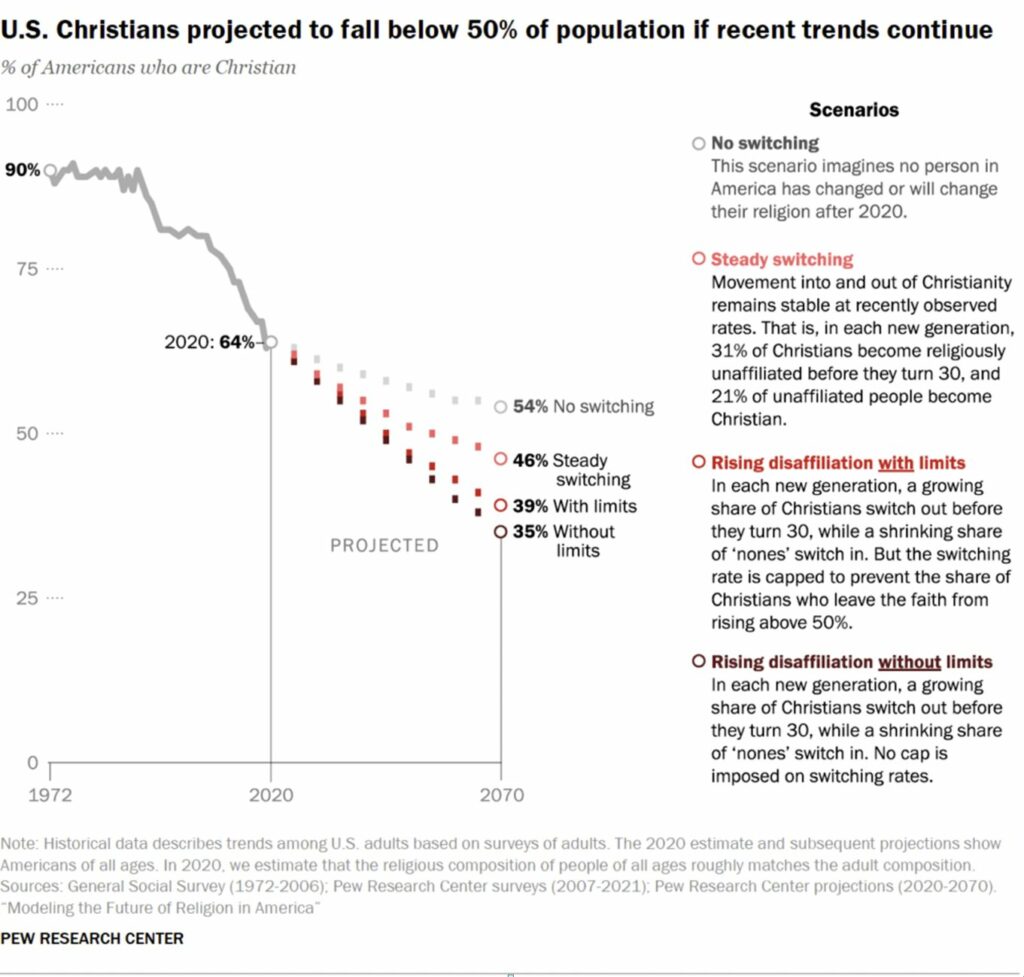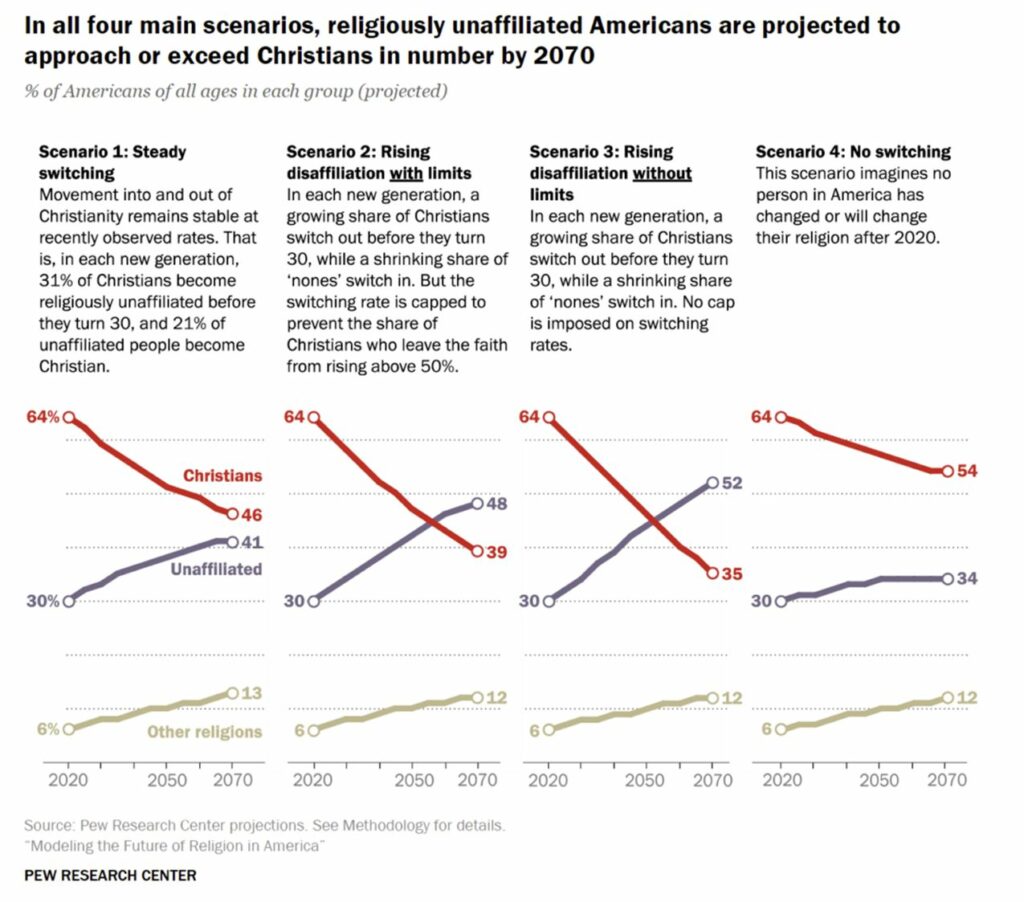December 20, 2022
At this time of year, when Christians around the world celebrate the birth of Jesus Christ, it is an appropriate time to contemplate the importance of religion, all religions, in our lives. Perhaps it is the perfect time to commit, or recommit, to living our religion to the best of our ability. This article will give you a glimpse of what’s at stake if we don’t.
The UFI board and staff wish you a very Merry Christmas and express our gratitude to you for joining us in protecting and defending the family! Let us never forget: “Christmas, it all began with a family.”
With gratitude for religion and family,
Wendy Wixom, President
United Families International
Will America End Up a “Godless Nation”
by Alexis Tarkalson
Alexis de Tocquiville, French political scientist and diplomat, traveled to the United States in 1831 to study the prison system there. He left with a broader knowledge of the American people than he bargained for, all of which he published in a book called “Democracy in America”. This book would explain to Europeans the individualism, equality, and liberty found in America in such a way that would immortalize the book as it is still read to this day.
A lesser-known topic in the book is that of religion in America. Tocqueville dove deep to paint a clear picture of how religion was the driving force for morals in the country and how it created a people unique to Europeans.
Regarding religion, Tocqueville showed that the American people used to be:
- Unified in responsibilities
- Greatly influenced by Christianity
- Faithful to a religion that regulated customs and domestic life
- Proud that women were strongholds of faith in a Deity
- Understanding that domestic life guided by religion contributes to a more wholesome state
- Prohibited from unjust innovations because of religion
- Understanding that religion maintained their republic institutions
- Cognitive that religion and state were in an alliance but not inherently tied together
What is the state of religion in America today?
If Tocqueville were to be alive today, I wonder what he would think about the state of religion in the U.S. As of today, fewer than half of the US population prays every day, and only 22% pray weekly/monthly. The population that “seldom does” or “never” went from 18% in 2007 to an increase of 32% in 2021. Only 4 in 10 adults would label religion as “very important in their lives”. Another survey found that only 25% of Americans go to church weekly, with 68% reporting only attending a few times a year.
This is all a vast contrast from the America Tocqueville knew and admired. Tocqueville wrote, “…there is no country in the world where the Christian religion retains a greater influence over the souls of men than in America; and there can be no greater proof of its utility and of its conformity to human nature than that its influence is powerfully felt over the most enlightened and free nation of the earth.”
He extrapolates quite masterfully the beauty religion can create when prioritized in a society, such as it was in America almost two-hundred years ago.
Where are we headed?
As of 2020, Christianity was the majority at 64%, religious ‘nones’ (unaffiliated with any religion) rank at 30% of the population, and religions outside of Christianity made up 6% (Jews, Muslims, Hindus, etc.).
The Pew Research Center recently released their projections of what the religious demographics of the US will look like by 2070, and things are not looking great for religion in general.
They reported that if recent trends continue the way they already are, Christians could fall from 64% to between 54-35%. For religious nones, they could see an increase of up to 34-52%. This is all due to the escalating numbers leaving Christianity and entering an atheist or agnostic lifestyle that started in the 1990’s.
Pew Research additionally explained the four scenarios shown on the graph above and indicated what likeliness each one had. The scenario that had the highest chances of seeing itself played out was “rising disaffiliation with limits”. This scenario would see progressively large numbers of individuals leaving the Christian faith by the age of 30 (as is happening now). Despite this, there will still be some Christian retention. In the end, by 2070, this scenario will result in 48% religious “nones” and 39% Christians.
Below is a closer look at the four scenarios.
The impact of a non-religious nation
To truly understand what life will be like in 2070 with religion being a minority, let’s look at what religion gives us.
A people that is actively engaged with religion weekly, will see 90% of their numbers contribute to charity and 70% participate in volunteer work. Family units are proven to be stronger when religion is a pillar for them, which in turn benefits society with less broken homes. Marital happiness and stability is found to be made stronger by regular church attendance. Religion inherently despises alcoholism, suicide, drug abuse, crime, etc., and thereby teaches individuals to hate those vices as well.
At the individual level, religion can work wonders. It helps a person with coping skills, to have less anxiety and depression, better health outcomes, and greater longevity. Additionally, religious people are found to have a stronger sense of self-control and increased resiliency.
These are just a few findings. What happens if all the contributions of religion fall away? You end up with a nation devoid of compassion for the weak and vulnerable, low donations to charity, and volunteer services in drastic need of help. Families are broken and marriages are torn apart. The nation’s people have low self-esteem, struggle with depression and anxiety, and social programs are being overrun with out-of-wedlock births, drug abuse, and welfare dependency. Kind of sounds like today, right? Imagine that exacerbated by another fifty years of decline in religion.
Why religion is so important for democracy
A Chinese economist once said,
“In your past, most Americans attended a church or synagogue every week. These were institutions that people respected. When you were there, from your youngest years, you were taught that you should voluntarily obey the law; that you should respect other people’s property, and not steal it. You were taught never to lie, and to respect the life and freedom of others the same as your own. Americans followed these rules because they had come to believe that even if the police didn’t catch them when they broke a law, God would catch them. Democracy works because most people most of the time voluntarily obey your laws.”
Although that was said in 2009 with modern words, the similar idea was already voiced by Alexis de Tocqueville nearly two centuries before. He said,
“Religion is much more necessary in the republic which they set forth in glowing colors than in the monarchy which they attack; it is more needed in democratic republics than in any others. How is it possible that society should escape destruction if the moral tie is not strengthened in proportion as the political tie is relaxed? And what can be done with a people who are their own masters if they are not submissive to the Deity?”
Religion is imperative for our government to work. The chaotic government and democracy we see now is a direct result of the decrease in religious people.
I will end with these two last thoughts from Tocqueville, “…men desert their religious opinions from lukewarmness rather than from dislike; they are not rejected, but they fall away” and “The two great dangers which threaten the existence of religion are schism and indifference”. Let us teach our children to cling to those vital religious faiths with a conviction that will guide them to a happy end. My favorite part about the title United Families International is united. Let us also be united in our efforts for a better world where everyone values and participates in a religion and religious freedom is available to all.
______________________________________________________________
Alexis Tarkalson was raised on a ranch in Dadeville, Missouri. She loves spending time with her husband, reading, hiking mountains, and learning new hobbies. She is currently a student at Brigham Young University-Idaho, where she is working to get a degree in Po



